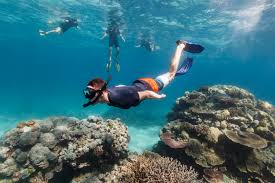Choosing the Right Snorkeling and Diving Gear for Your Trip.
Choosing the Right Snorkeling and Diving Gear for Your Trip.

Exploring the underwater world is one of the most captivating experiences a traveler can have. Whether you’re snorkeling along vibrant coral reefs or diving into the depths to witness marine life up close, having the right equipment greatly enhances your safety, comfort, and enjoyment. Selecting the appropriate snorkeling and diving gear is essential for a successful trip, yet many travelers are overwhelmed by the variety of options available.
This comprehensive guide will help you understand the essential gear you need for snorkeling and diving, how to choose it wisely, and tips to make your underwater adventure unforgettable.
Understanding Snorkeling vs. Diving Gear
While snorkeling and diving share some equipment, each activity demands specific gear due to different depths, durations, and safety requirements.
- Snorkeling Gear typically includes a mask, snorkel, fins, and optional accessories like wetsuits or rash guards. Snorkeling generally takes place near the water’s surface, requiring simpler and lighter equipment.
- Diving Gear involves more complex systems such as scuba tanks, regulators, buoyancy control devices (BCD), wetsuits or drysuits, dive computers, and safety gear. Diving allows exploration of deeper waters and requires certified training and specialized gear.
Understanding these differences helps you decide which equipment suits your planned activity.
Essential Snorkeling Gear
1. Snorkel Mask
A well-fitting mask is crucial to provide clear vision underwater and keep water out. Look for:
- Tempered Glass Lens: Durable and scratch-resistant for better clarity.
- Silicone Skirt: Soft, flexible edges that seal comfortably around your face.
- Wide Field of View: Some masks offer panoramic views, enhancing the underwater experience.
Try different masks before purchasing to ensure a leak-free fit.
2. Snorkel Tube
The snorkel allows you to breathe while face-down on the surface. Features to consider:
- Purge Valve: Helps clear water easily.
- Splash Guard or Dry Top: Prevents water from entering the tube when waves splash.
- Comfortable Mouthpiece: Silicone mouthpieces reduce jaw fatigue.
3. Fins
Fins increase propulsion, making swimming more efficient.
- Full-Foot Fins: Best for warm waters and snorkeling near shore.
- Open-Heel Fins: Adjustable straps fit over boots, ideal for diving or colder water.
Look for lightweight, durable materials with flexible blades.
4. Wetsuits and Rash Guards
Depending on water temperature and sun exposure:
- Wetsuits: Provide insulation in cooler waters, available in different thicknesses.
- Rash Guards: Lightweight shirts that protect against sunburn, jellyfish stings, and abrasions.
5. Optional Accessories
- Snorkeling Vest: Provides buoyancy for beginners.
- Defogging Spray: Prevents mask fogging for clear vision.
- Waterproof Bags: To keep valuables safe while in the water.
Essential Diving Gear
1. Mask and Snorkel
Diving masks share similarities with snorkeling masks but often have a lower volume for easier clearing underwater.
Snorkels are less critical for divers but useful on the surface.
2. Regulators
The regulator delivers air from your scuba tank to your mouth. Key components:
- Primary Regulator: Your main breathing device.
- Octopus (Alternate Air Source): Backup regulator for emergencies.
- Pressure Gauge: Shows remaining air in the tank.
High-quality regulators ensure smooth airflow and durability.
3. Buoyancy Control Device (BCD)
The BCD helps you control buoyancy underwater and on the surface. Features include:
- Inflation and Deflation Mechanisms: To adjust buoyancy precisely.
- D-Rings and Attachment Points: For securing gear.
Comfortable fit and ease of use are essential.
4. Scuba Tank
Tanks come in various sizes and materials (aluminum or steel). The choice depends on dive duration and personal preference.
5. Wetsuits and Drysuits
Thermal protection is vital in deeper or colder waters.
- Wetsuits: Provide insulation by trapping a thin layer of water.
- Drysuits: Keep you completely dry, ideal for very cold environments.
6. Dive Computer
Modern dive computers monitor depth, time, and decompression status to ensure safe diving.
7. Fins
Diving fins are typically larger and stiffer to provide power for underwater swimming.
8. Other Safety Gear
- Dive Knife: For emergencies such as entanglement.
- Surface Marker Buoy (SMB): Signals your position to boats.
- Underwater Torch: Useful for night dives or low visibility.
Tips for Choosing the Right Gear
Prioritize Fit and Comfort
Ill-fitting gear can ruin your experience. Masks should seal without tightness, fins should fit snugly without causing cramps, and wetsuits should allow flexibility.
Consider Water Conditions
Tropical warm water snorkeling requires lighter gear, while cold water diving demands thicker wetsuits or drysuits.
Invest in Quality
Reliable, durable gear enhances safety and lasts longer. Avoid low-quality products that might fail underwater.
Rent vs. Buy
For occasional snorkelers or divers, renting gear at your destination may be more practical. However, owning your mask and fins ensures hygiene and comfort.
Maintain Your Equipment
Rinse gear with fresh water after use, store properly, and service regulators annually.
Packing and Traveling with Your Gear
- Use Protective Cases: Masks and regulators are fragile and need cushioned storage.
- Check Airline Policies: Scuba tanks often cannot be transported by air unless empty and meet specific regulations.
- Keep Essentials in Carry-On: Items like masks and snorkels are best kept with you.
Conclusion
Selecting the right snorkeling and diving equipment is key to unlocking the wonders beneath the waves. Thoughtful choices based on your experience level, trip type, and water conditions will maximize comfort and safety.
Whether you’re admiring coral reefs while snorkeling or exploring deep wrecks on a dive, the proper gear lets you focus on the magic of the underwater world without distraction. Prepare carefully, respect marine environments, and your aquatic adventures will be memories you cherish forever.


